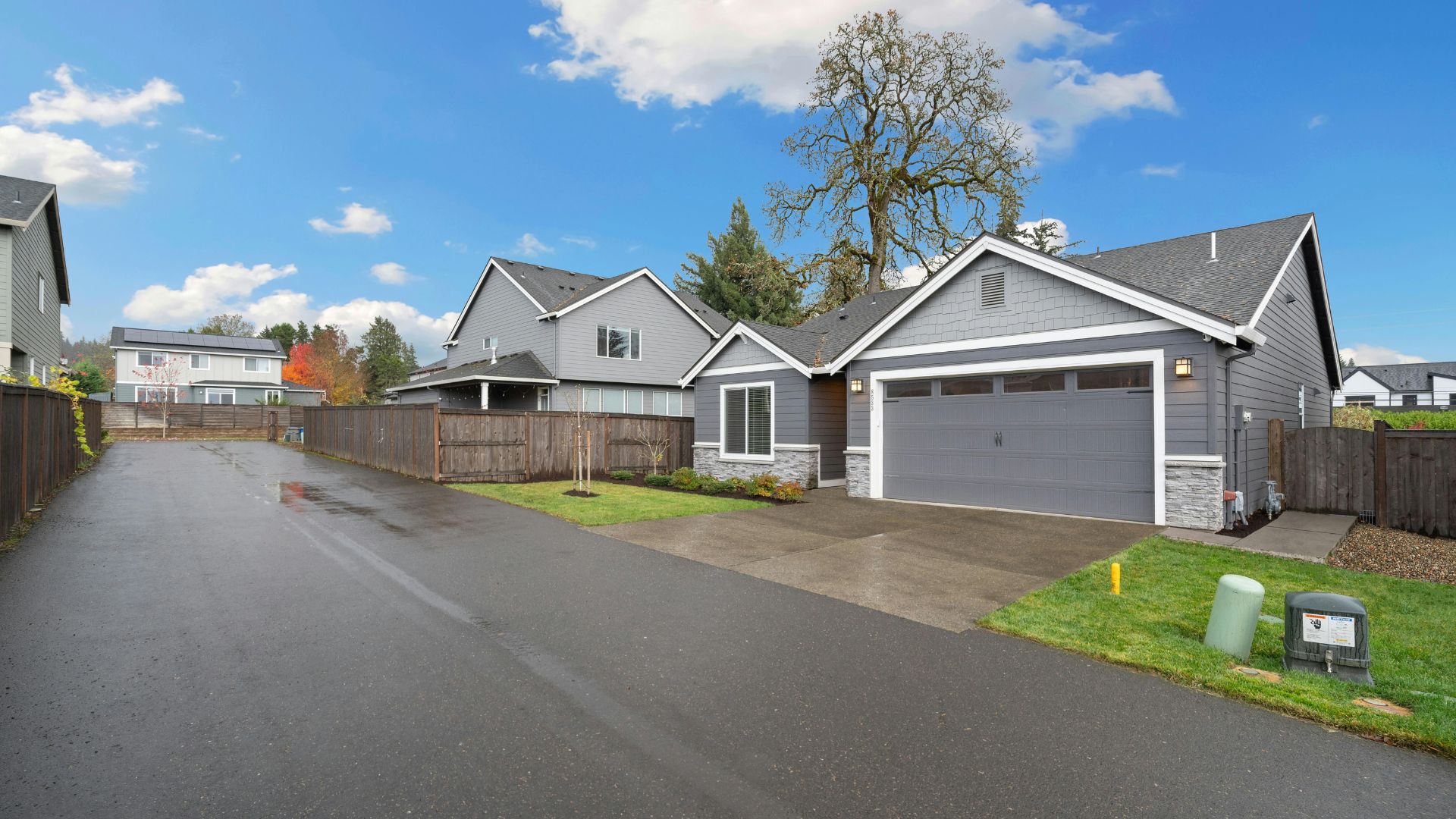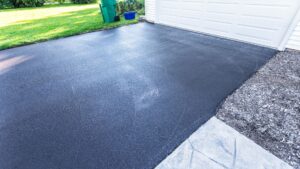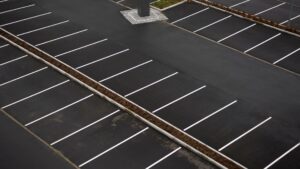material. Asphalt and concrete are the two most common options, and each has its own set of advantages and drawbacks. The right choice for your driveway depends on your budget, climate, aesthetic preferences, and how much maintenance you’re willing to handle over the years.
In this article, we’ll break down the key differences between asphalt and concrete to help you make the best decision for your home.
Cost Comparison
Asphalt is generally more affordable than concrete upfront. On average, asphalt installation costs range from $3 to $5 per square foot, while concrete can cost $6 to $10 per square foot or more, depending on the design and finish.
If you’re on a tight budget and need a quick and economical solution, asphalt is often the go-to choice. The savings can be significant, especially for large driveways or commercial applications.
Installation Time
When it comes to how quickly you can start using your new driveway, asphalt has the edge. Asphalt driveways are usually ready for vehicle traffic within 48 to 72 hours after installation. In contrast, concrete driveways may need up to a week to cure fully before they can support cars and trucks.
If you’re looking for minimal disruption and faster results, asphalt is the more convenient option.
Durability and Longevity
Concrete tends to last longer than asphalt under the right conditions. A well-installed and properly maintained concrete driveway can last 30 to 40 years, while an asphalt driveway typically lasts 20 to 30 years.
However, this doesn’t mean concrete is always the superior choice. Asphalt is more flexible, which means it can better withstand minor ground movement or settling without cracking. This makes asphalt a better choice for areas with frequent freeze-thaw cycles, as concrete is more prone to cracking in such conditions.
Maintenance and Repairs
Asphalt requires more regular maintenance, but it’s also easier and cheaper to repair.
- Sealing: Asphalt driveways should be sealed every 2 to 3 years to protect against water damage and extend their life.
- Repairs: Minor cracks and holes in asphalt can usually be patched quickly and inexpensively.
Concrete driveways, on the other hand, do not need sealing as often (though it is still recommended), but repairs can be more costly and complicated. Concrete patches often don’t match the original surface, leading to noticeable blemishes.
If you’re comfortable with a bit of routine maintenance, asphalt offers a lower-cost, easier-to-repair option over time.
Appearance and Customization
Concrete wins in the aesthetic department. It offers more options for customization, including:
- Stamping
- Coloring
- Brushed finishes
- Decorative borders
These features can give your driveway a high-end look that complements your home’s style.
Asphalt is generally black and has a uniform appearance. While it can look clean and professional when new, it offers fewer customization options. However, some homeowners prefer the sleek, simple look of freshly paved asphalt.
If design and curb appeal are a priority, concrete may be the better choice for your driveway.
Weather Performance
Climate plays a big role in choosing between asphalt and concrete.
- Cold Climates: Asphalt performs better in cold weather. Its flexibility helps it expand and contract without cracking during freeze-thaw cycles. Additionally, asphalt absorbs more heat, which helps snow and ice melt faster in the winter.
- Hot Climates: Concrete is better suited for hot climates. Asphalt can become soft and sticky in extreme heat, leading to surface damage and rutting.
In short, if you live in a northern or temperate region, asphalt may be more durable in the long term. If you live in a hot, southern area, concrete may provide better resilience against heat.
Environmental Impact
Both materials have environmental considerations.
- Asphalt is 100% recyclable, and reclaimed asphalt pavement (RAP) is commonly reused in new paving projects.
- Concrete production requires significant energy and releases more CO₂, but concrete itself is durable and requires less frequent replacement.
If sustainability is important to you, ask your contractor about eco-friendly asphalt mixes or permeable concrete options designed to reduce runoff and improve water drainage.
Summary: Pros and Cons
Here’s a quick breakdown of the pros and cons of each material:
Asphalt Driveways
Pros:
- Lower upfront cost
- Faster installation
- Better for cold climates
- Easier and cheaper to repair
- Recyclable and eco-friendly options available
Cons:
- Requires regular sealing
- Shorter lifespan
- Fewer design/customization options
- Softens in extreme heat
Concrete Driveways
Pros:
- Longer lifespan
- Minimal maintenance
- Highly customizable appearance
- Performs better in hot climates
Cons:
- Higher initial cost
- Longer curing time
- Prone to cracking in freeze-thaw cycles
- Repairs are more visible and costly
Final Thoughts: Which One Is Right for You?
Choosing between asphalt and concrete comes down to your budget, climate, aesthetic goals, and willingness to maintain the surface over time.
If you’re looking for an affordable, quick-to-install, and cold-climate-friendly solution, asphalt is likely your best bet. But if you want a long-lasting, stylish, and low-maintenance option, especially in a warmer region, concrete may be worth the investment.
Still unsure? Our team at [Your Company Name] is here to help. We offer both asphalt and concrete paving services and can guide you toward the best choice for your driveway based on your specific needs and location.




